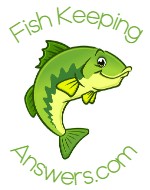Affiliate Disclaimer:
FishKeepingAnswers.com is reader-supported. When you buy through links on our site we may earn a commission.
Do Guppies eat algae? No, guppies do not eat algae! Guppies may be seen picking at algae, but they don’t actually eat it. Guppies pick at algae to remove and eat microscopic crustaceans and uneaten food which has been caught in the algae. It is a common misconception that guppies eat algae.
I have been keeping and breeding guppies for over 30 years. My very first aquarium was a 10-gallon aquarium I was given with a small group of guppies. Since that day, I have been hooked on guppies. I don’t think a day has passed when I didn’t have at least one aquarium filled with guppies.
I’ve Read Elsewhere Other People Saying Guppies DO Eat Algae?
Unfortunately, the internet is full of people just churning out rubbish they have read elsewhere. My articles are based on decades of actually keeping fish, including keeping and breeding guppies.
Guppies will ‘pick’ at algae in the pursuit of what is in it, such as microscopic crustaceans and uneaten food which has gotten caught in the algae.
Why Do Guppies Pick At Algae?
Guppies are scavengers. They will eat anything they come across. They will spend most of their waking day searching for food.
Algae, especially hair algae, will catch small pieces of uneaten food which floats around the aquarium.
Algae also provide a home to microscopic life which lives in your aquarium. Guppies will happily take advantage of this food source and will be seen picking at the algae.
If Guppies Don’t Eat Algae, What Do They Eat?
Guppies are omnivores. As such, they need a mixed diet that consists of both vegetable matter and animal protein.
A good quality flake food or mini pellet should form the basis of a guppy diet. I have had great success feeding my guppies Bug Bites Flakes by Fluval and Vibrabites by Hikari. Guppies also benefit from the addition of live or frozen foods such as bloodworms, daphnia, or mosquito larvae.
I tend to prefer frozen cubes of bloodworms rather than live bloodworms as frozen bloodworms are easier to store. I keep a packet or two in the freezer all the time so I can just drop a cube into the aquarium whenever I feel like it.
Is Algae In My Aquarium Bad?
No, contrary to popular belief, algae is not bad in an aquarium. In fact, algae are beneficial to an aquarium ecosystem.
Algae, much like plants, absorb excess nutrients in the water column and helps process fish waste (ammonia), and actually make the aquarium water ‘cleaner’ and safer for the fish. Algae is a major part of nature’s natural filtration system.
We, as aquarists, don’t like algae because we think it makes our aquariums look bad. Algae covers our glass, decorations, and even plants if it gets out of control. This is purely a cosmetic issue.
What Fish DO Eat Algae?
There are many species of fish that eat algae, although most of them specialize in a single type of algae. If you are looking for a fish to help battle your algae, you first need to identify which algae you have growing.
- Brown Diatom Algae: Brown Diatom Algae is often one of the first algaes to appear in a new aquarium. Brown Diatom Algae is a dusty, powder-like algae that grows on all surfaces in the aquarium. Brown Diatom Algae is easily removed and is eaten by several fish species including Otocinclus. Brown Diatom Algae is one of the easiest algaes to get rid of.
- Black Beard Algae (BBA): Black Beard Algae is one of the most persistent algaes and can be very tricky to get rid of. BBA grows in thick clumps and sticks to everything. There are two fish commonly available in the freshwater hobby that will eat BBA, Siamese Algae Eaters, and Florida Flagfish. Amano shrimp will also eat BBA, but you do need a lot of them to make an impact on the algae.
- Hair Algae: Hair Algae (which actually describes a whole collection of algaes) gets its name because it looks like a clump of wet hair when you remove it from the aquarium. Like Black Beard Algae, There are few fish that will eat it. Siamese Algae Eaters and Florida Flagfish will both have a go at it, as will Black Mollies and Rosy Barbs.
- Green Spot Algae: Green Spot Algae grows, as the name suggests, as greens spots! It can be very hard to get rid of. A sharp blade can be used to remove it from the aquarium glass, but it is almost impossible to get off plants etc. I am not aware of any fish that will eat Green Spot Algae. However, Nerite Snails will eat it. Nerite Snails pose no threat to aquarium plants, and they can’t breed in freshwater, so they won’t overrun your aquarium.
In Conclusion
Despite what you may have read elsewhere, guppies DO NOT eat algae. They will pick at it, but they are just looking for bits they can eat. To keep your guppies happy and healthy, feed them a balanced diet made up of good quality flake food or pellets with the addition of some live or frozen foods.
Algae itself is not bad to have in an aquarium. In fact, it is surprisingly beneficial.









